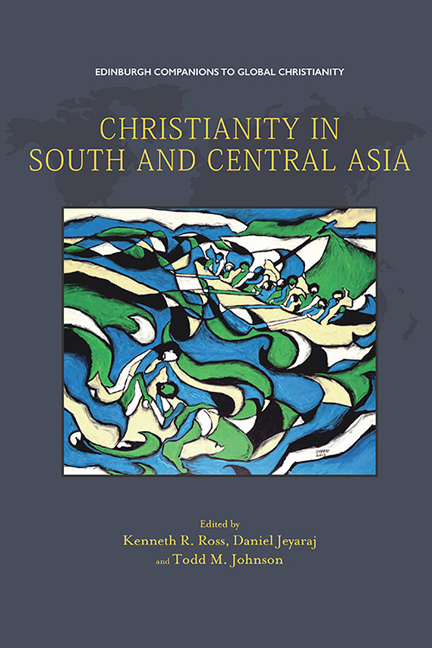Orthodox
Published online by Cambridge University Press: 30 April 2020
Summary
This essay engages with contemporary Orthodox (Chalcedonian) and Oriental Orthodox (pre-Chalcedonian) Christian communities in South and Central Asia. While these families of Churches are addressed together in this essay, it should be underlined that the Orthodox and the Oriental Orthodox have developed distinct theological, ecclesiastical and liturgical traditions. In addition, while the broad umbrella term ‘Oriental Orthodox’ is employed for the five pre-Chalcedonian Churches, this terminology is contemporary and should not overshadow the context-specific distinctiveness of each of these five Churches.
The early Christianisation of Central Asia is attributed in general to the influence of the Hellenised and Christianised Roman Empire, with its centre in Constantinople, and the extensive missionary activity of the Church of the East (also known as ‘Nestorian’). The majority of present-day Orthodox Christians in Central Asia are Slavs who inhabited the Central Asian geography during imperial Russian expansion in the eighteenth and nineteenth centuries. They comprise primarily Russians, Ukrainians and Belarusians. Central Asia is also home to a substantive Armenian community, primarily affiliated with the Armenian Apostolic Church (also known as ‘Gregorian’), Armenia's national church since the early fourth century. As one of the five Oriental Orthodox Churches which follow the miaphysite Christology, in contrast to the Chalcedonian Orthodox Church, the Armenians in Asia have an ancient history.
Various early writers associated apostolic activity with the spread of Christianity in parts of present-day Iran, Pakistan, Afghanistan, India and Sri Lanka. The Oriental Orthodox Christians of India, who trace their origins to the purported apostolic activity of St Thomas, cover by far the largest proportion in South Asia. The original Syrian Christian community has now divided into various denominations, generally as a result of contact with Western missions from the sixteenth century onwards. These include three Oriental Orthodox denominations: the Malankara Jacobite Syriac Orthodox Church (MJSOC), the Malankara Orthodox Syrian Church (MOSC) and the Malabar Independent Church (Thozhiyur Church). A community of St Thomas Christians is also known to have existed in Sri Lanka, later to be absorbed by Western Christian missions.
Asia has also been home to members of the Armenian Apostolic Church, and this reflects the history of the ancient Armenian nation, which, located at the crux of civilisations, was shaped by numerous invasions, territorial contentions and genocidal displacements.
- Type
- Chapter
- Information
- Christianity in South and Central Asia , pp. 223 - 235Publisher: Edinburgh University PressPrint publication year: 2019



